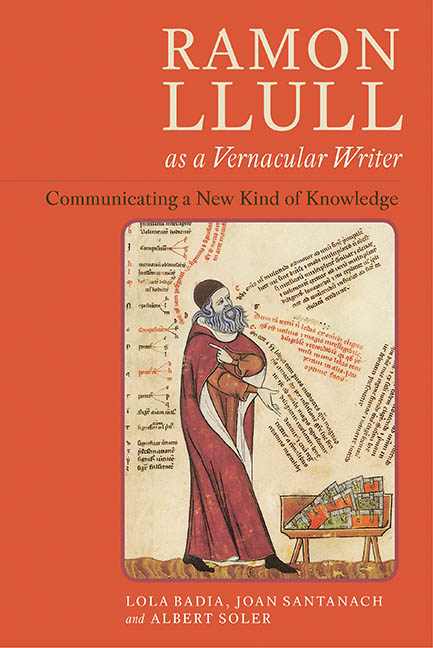Book contents
- Frontmatter
- Dedication
- Contents
- Illustrations
- Acknowledgements
- Abbreviations
- Introduction
- 1 Ramon Llull's Art, Language, and Literary Expression
- 2 Style and Genre in the Writings of Ramon Llull
- 3 The Composition and Dissemination of Ramon Llull's Texts, from Script to Print
- 4 Ramon Llull's Vernacular Context
- Epilogue. Ramon Llull's OEuvre as a Whole: Autobiographism and Self-Referentiality
- Appendix 1 First-Generation Llullian Manuscripts
- Appendix 2 Catalan Language and Literature in Relation to Ramon Llull
- Bibliography
- Index
Epilogue. Ramon Llull's OEuvre as a Whole: Autobiographism and Self-Referentiality
Published online by Cambridge University Press: 05 June 2016
- Frontmatter
- Dedication
- Contents
- Illustrations
- Acknowledgements
- Abbreviations
- Introduction
- 1 Ramon Llull's Art, Language, and Literary Expression
- 2 Style and Genre in the Writings of Ramon Llull
- 3 The Composition and Dissemination of Ramon Llull's Texts, from Script to Print
- 4 Ramon Llull's Vernacular Context
- Epilogue. Ramon Llull's OEuvre as a Whole: Autobiographism and Self-Referentiality
- Appendix 1 First-Generation Llullian Manuscripts
- Appendix 2 Catalan Language and Literature in Relation to Ramon Llull
- Bibliography
- Index
Summary
The modes of production and dissemination of texts by Ramon Llull play a fundamental role in the preparation of critical editions of his works. We substantiated this fact in the final section of Chapter 3, having explained in the opening sections the reason why those same modes are characteristic features of Llull's status as a vernacular author. When the editor of a Llullian work has comparatively early manuscript witnesses to hand, he or she has to be able to identify the way in which our author aimed to steer interpretation by means of elements relating to the materiality of his texts and the format of their manuscripts. By exploiting such elements, Llull sought to determine the way in which the works’ readers were to perceive them. We assume that all these elements endow his works with a specific meaning.
In Chapter 1 we explored Llull's contributions to the theory of language and literary expression, both via his own formulations and by bringing together information gleaned from an examination of his works. We highlighted his monograph dedicated to rhetoric and showed that Llull situated language within the framework of the bodily senses, reflected upon grammar, tested out in a highly personal manner the resources of allegory, championed obscurity with didactic ends in mind, proposed a radical reform of homiletics and undertook self-commentary; to all this should be added the unusual practice of self-translation, which we discussed in Chapter 3 (pp. 174–94).
In Chapter 2 we described the variety of forms of expression found in Llull's oeuvre, special attention being paid to its literary dimension: the colossal Book of Contemplation on God, the first didactic handbooks for the laity, the two extensive narratives in the service of the Art, namely, Blaquerna and Felix, the verse works, the dialogues, the short forms and the spiritual and contemplative literature governed by the Art. In Chapter 4, finally, we presented an overview of the relations between Llull and certain contemporary writers, as well as of the reception of his oeuvre within the Catalan cultural tradition.
- Type
- Chapter
- Information
- Ramon Llull as a Vernacular WriterCommunicating a New Kind of Knowledge, pp. 265 - 310Publisher: Boydell & BrewerPrint publication year: 2016



